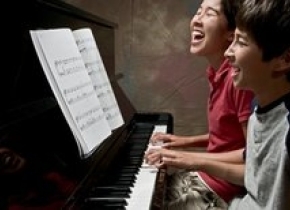

为期六个月的钢琴课可以提高幼儿大脑对不同音调的反应力,并且提高他们区分两个发音相似单词的能力。
撰文/播音 克里斯多佛•因塔利亚塔(Christopher Intagliata)
翻译 许楠
审校 郭晓
Musicians are said to have better language skills. And scientific studies have backed that up. But it's not clear why that might be the case.
据说音乐家有更好的语言技能。科学研究也证实了这一点。但是其中的原因目前尚不清楚。
Now a study of 74 Chinese kindergartners suggests six months of piano lessons can heighten the brain's response to changes in pitch. And kids who got piano lessons were also better at telling apart two similar-sounding Mandarin words, which contained different consonants, than were students who got extra reading training, or who went through regular kindergarten.
The results are in the Proceedings of the National Academy of Sciences. [Yun Nan et al., Piano training enhances the neural processing of pitch and improves speech perception in Mandarin-speaking children]
近期一项对74名中国幼儿园小朋友的研究表明,为期六个月的钢琴课,可以提高大脑对音调变化的反应力。与接受过额外阅读训练或者正常上幼儿园的孩子相比,学过钢琴的孩子还更善于区分包含不同辅音的两个发音相似的普通话单词。该研究结果发表在《美国国家科学院院刊》上( Proceedings of the National Academy of Sciences)[Yun Nan et al., Piano training enhances the neural processing of pitch and improves speech perception in Mandarin-speaking children]。
Now Mandarin is a tonal language—the famous example is the word 'ma' which can mean mother or horse depending on its pitch. So might musical training translate better to Mandarin, than, say, English?
普通话是一种有音调的语言——举个有名的例子:ma,它的意思可以是“妈”或“马”,这取决于它的音调。所以与英文相比,音乐训练是否对普通话的影响效果更好呢?
"Yeah it's possible that influenced the results." Robert Desimone, a neuroscientist at the McGovern Institute at MIT. But he says other studies do back up the fact that music lessons benefit language learners, even in countries without tonal languages. "And what our study added on top of that was some idea of the neural basis for those benefits."
“是的,有可能会对结果造成影响。” 麻省理工学院麦戈文研究所的神经学家罗伯特·德西蒙(Robert Desimone)说。但他说其他研究也支持“音乐课程对语言学习是有益的”这一事实,即使是在没有音调语言的国家中。“我们的研究为这些结论提供了神经基础方面的解释。”
And if you don't own a piano, don't despair. The reading group actually did just as good on many measures as the piano group. "Reading's pretty good actually. We don't mean to downplay reading instruction."
如果你没有钢琴,不要失望。在实验中,进行阅读的分组在很多方面都和钢琴组一样出色。“阅读是件好事,我们并非要忽视阅读教学。
More important, he says, was to show piano wasn't worse than reading for these skills… perhaps encouraging cash-strapped schools to keep their music programs alive.
他说,更重要的是说明对于提高语言技能,弹钢琴不比阅读更差,这或许可以鼓励资金紧张的学校继续开展音乐课。
 京公网安备11010502039775号
京公网安备11010502039775号